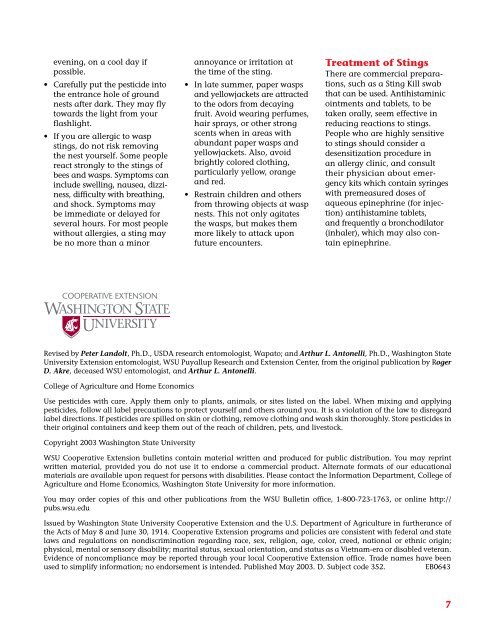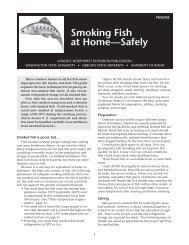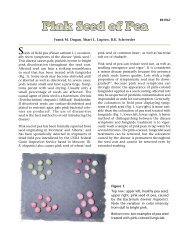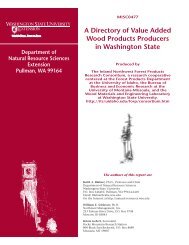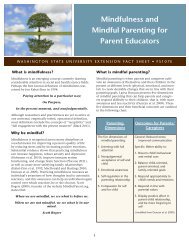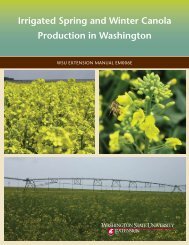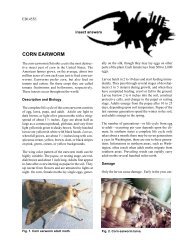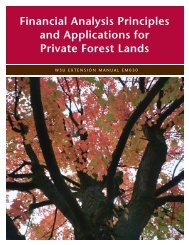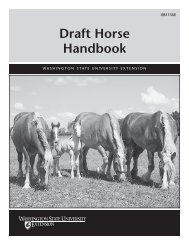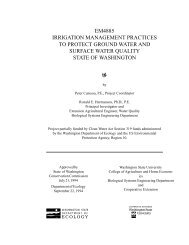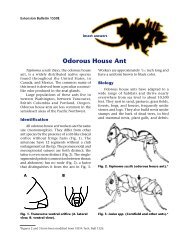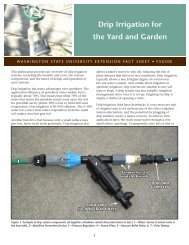Yellowjackets and Paper Wasps Yellowjackets and Paper Wasps
Yellowjackets and Paper Wasps Yellowjackets and Paper Wasps
Yellowjackets and Paper Wasps Yellowjackets and Paper Wasps
You also want an ePaper? Increase the reach of your titles
YUMPU automatically turns print PDFs into web optimized ePapers that Google loves.
evening, on a cool day if<br />
possible.<br />
• Carefully put the pesticide into<br />
the entrance hole of ground<br />
nests after dark. They may fly<br />
towards the light from your<br />
flashlight.<br />
• If you are allergic to wasp<br />
stings, do not risk removing<br />
the nest yourself. Some people<br />
react strongly to the stings of<br />
bees <strong>and</strong> wasps. Symptoms can<br />
include swelling, nausea, dizziness,<br />
difficulty with breathing,<br />
<strong>and</strong> shock. Symptoms may<br />
be immediate or delayed for<br />
several hours. For most people<br />
without allergies, a sting may<br />
be no more than a minor<br />
COOPERATIVE EXTENSION<br />
annoyance or irritation at<br />
the time of the sting.<br />
• In late summer, paper wasps<br />
<strong>and</strong> yellowjackets are attracted<br />
to the odors from decaying<br />
fruit. Avoid wearing perfumes,<br />
hair sprays, or other strong<br />
scents when in areas with<br />
abundant paper wasps <strong>and</strong><br />
yellowjackets. Also, avoid<br />
brightly colored clothing,<br />
particularly yellow, orange<br />
<strong>and</strong> red.<br />
• Restrain children <strong>and</strong> others<br />
from throwing objects at wasp<br />
nests. This not only agitates<br />
the wasps, but makes them<br />
more likely to attack upon<br />
future encounters.<br />
Treatment of Stings<br />
There are commercial preparations,<br />
such as a Sting Kill swab<br />
that can be used. Antihistaminic<br />
ointments <strong>and</strong> tablets, to be<br />
taken orally, seem effective in<br />
reducing reactions to stings.<br />
People who are highly sensitive<br />
to stings should consider a<br />
desensitization procedure in<br />
an allergy clinic, <strong>and</strong> consult<br />
their physician about emergency<br />
kits which contain syringes<br />
with premeasured doses of<br />
aqueous epinephrine (for injection)<br />
antihistamine tablets,<br />
<strong>and</strong> frequently a bronchodilator<br />
(inhaler), which may also contain<br />
epinephrine.<br />
Revised by Peter L<strong>and</strong>olt, Ph.D., USDA research entomologist, Wapato; <strong>and</strong> Arthur L. Antonelli, Ph.D., Washington State<br />
University Extension entomologist, WSU Puyallup Research <strong>and</strong> Extension Center, from the original publication by Roger<br />
D. Akre, deceased WSU entomologist, <strong>and</strong> Arthur L. Antonelli.<br />
College of Agriculture <strong>and</strong> Home Economics<br />
Use pesticides with care. Apply them only to plants, animals, or sites listed on the label. When mixing <strong>and</strong> applying<br />
pesticides, follow all label precautions to protect yourself <strong>and</strong> others around you. It is a violation of the law to disregard<br />
label directions. If pesticides are spilled on skin or clothing, remove clothing <strong>and</strong> wash skin thoroughly. Store pesticides in<br />
their original containers <strong>and</strong> keep them out of the reach of children, pets, <strong>and</strong> livestock.<br />
Copyright 2003 Washington State University<br />
WSU Cooperative Extension bulletins contain material written <strong>and</strong> produced for public distribution. You may reprint<br />
written material, provided you do not use it to endorse a commercial product. Alternate formats of our educational<br />
materials are available upon request for persons with disabilities. Please contact the Information Department, College of<br />
Agriculture <strong>and</strong> Home Economics, Washington State University for more information.<br />
You may order copies of this <strong>and</strong> other publications from the WSU Bulletin office, 1-800-723-1763, or online http://<br />
pubs.wsu.edu<br />
Issued by Washington State University Cooperative Extension <strong>and</strong> the U.S. Department of Agriculture in furtherance of<br />
the Acts of May 8 <strong>and</strong> June 30, 1914. Cooperative Extension programs <strong>and</strong> policies are consistent with federal <strong>and</strong> state<br />
laws <strong>and</strong> regulations on nondiscrimination regarding race, sex, religion, age, color, creed, national or ethnic origin;<br />
physical, mental or sensory disability; marital status, sexual orientation, <strong>and</strong> status as a Vietnam-era or disabled veteran.<br />
Evidence of noncompliance may be reported through your local Cooperative Extension office. Trade names have been<br />
used to simplify information; no endorsement is intended. Published May 2003. D. Subject code 352. EB0643<br />
7


